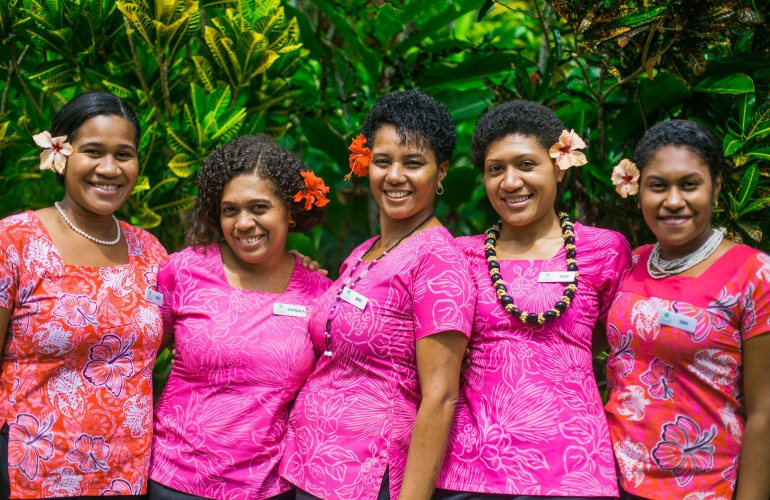Bula!
If you’re planning your dream getaway at our Namale Resort and Spa in Fiji, you might feel a little apprehensive about not knowing the local language. But no need to worry! Fijians are considered some of the friendliest people in the world, and they are sure to welcome you to their island with open arms, regardless of whether or not you can speak the language.
That said, learning a few essential words and phrases in the Fijian language is a great way to immerse yourself in the culture. Not only can this help make it easier to get around and communicate with the locals, but showing that you’ve taken the time to study their language is a big sign of respect. Even just trying out one or two phrases can make a big difference!
Whether you’re looking to learn a few simple words like “hello” in Fijian or master full-on phrases and sentences, our guide to the Fiji language can help! With these words and phrases in your back pocket, you’ll be all set to make friends and experience the vibrant culture on your next vacation in Fiji!
What language do they speak in Fiji?
The most commonly spoken language is Fijian. This Austronesian language of the Malayo-Polynesian family, introduced to the island over 3,500 years ago, is the island’s official language. However, it’s not uncommon to hear English and Hindi spoken on the island, too, as they’re also the official languages of Fiji.
Is Fijian hard to learn?
The Fijian language isn’t considered a tough language to learn, but it’s not something you will master overnight. Learning other languages takes time, patience, and plenty of practice. The best way to study this language is by immersing yourself in Fijian culture and conversing with native speakers. The more you practice, the better you’ll get!
The Basics
“Bula” is the Fijian greeting for hello, or welcome – you’ll hear it over and over again when you visit Fiji.
Bula literally translates to “life,” but it has many meanings. When Fijians use it as a greeting, they are wishing you good health. You may also hear it paired with “vinaka.” What is the “bula vinkaka” meaning? It means “the good life” and is used as a warm welcome. Furthermore, Fijians use bula after someone sneezes, the same way many say “bless you” in English. Having a drink with some new Fijian friends? Bula works as “cheers,” too.
Other variations of bula that you will hear in Fiji are “drau bula” or “dou bula.” You can spice up your greetings to impress local Fijians by saying “ni bula” for good day, and “ni sa bula” for good evening.
Your simple yes and no are: Yes= io, and no= sega.
Fijian Pronunciation Guide
The Fijian language is melodic and welcoming. Even learning just a few basic phrases can help you feel more connected during your stay. The rhythm and sound of the Fijian language reflect the warmth and kindness you’ll experience throughout the islands. While Fijian is relatively easy to pick up, pronunciation can be a little different than what English speakers are used to, which is why we’ve made it simple for you to follow along.
Most vowels in the Fijian language are pronounced similarly to Spanish or Italian. For example, a is pronounced like ah, e like eh, and i like ee. Consonants are generally familiar, but there are a few unique features to remember. The letter c is pronounced like the th in “this,” so the word moce, which means goodbye, is pronounced moe-they.
Another tip to keep in mind is that stress usually falls on the second-to-last syllable. For example, vinaka, which means thank you, is pronounced vee-NAH-kah. Once you get the rhythm, the Fijian language tends to flow naturally.
You do not have to be perfect. People in Fiji are incredibly gracious and genuinely appreciate any effort you make to speak their language. A few simple words can open the door to warm smiles, new friendships, and a more meaningful travel experience.
Fijian Culture and Language: Customs to Know
Fijian isn’t just how people talk, it’s how they connect. The way Fijians use language reflects what really matters here: community, kindness, and mutual respect. Take the word vinaka, for example. It means thank you, but it also carries a sense of genuine appreciation. Then there’s kerekere, meaning please, which you’ll hear when someone’s making a polite request. It’s not just good manners, it’s about asking with humility and respect, something deeply valued in daily life.
You’ll notice it right away in how people talk to one another, especially in traditional settings like village visits or cultural ceremonies. The Fijian language is used carefully, with a lot of heart behind it. Speaking softly and respectfully, especially around elders or chiefs, is the norm. It’s a way of maintaining harmony and showing care for the community.
Even if you only learn a few Fijian language phrases during your stay, it can make a big difference. Locals are incredibly welcoming, and they love it when visitors make the effort to speak even a little of the language.
Now that you have some Fijian words and phrases under your belt, it’s time to create the perfect island getaway here at Namale Resort & Spa. Whether celebrating your honeymoon or indulging in a much-needed vacation, our luxury boutique resort promises to exceed your expectations. Contact us today for a quote, check out our special offers, and get ready to say “bula” to your island vacation with us!


